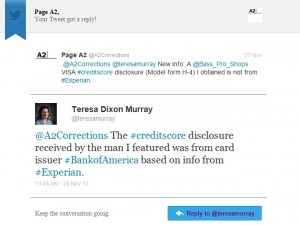In April, using his News Corporation Fox Business thingy, Rupert Murdoch published, “According to the Society for Human Resource Management, 60% of employers check applicants’ credit scores for at least some of their job candidates as part of their hiring process.”

Fox Business website before correction
That is nonsense, of course, and somebody changed the Fox story. The new sentence, substituting reports for scores, is “According to the Society for Human Resource Management, 60% of employers check applicants’ credit reports for at least some of their job candidates as part of their hiring process.”
[Rookie reporters and journalism students: Don’t be afraid to check original sources (Wouldn’t that be novel?).]
But, there is no acknowledgement on that story’s page (whose title uses a question mark) by Murdoch of the error and its correction. That is not to say, however, that he always acts in such a clandestine manner. Within another property in his empire, there was clear acknowledgement of the same error.
Unfortunately, due to the syndicated error phenomena, the zombie myth lives.
It also lives in a certain Louisiana State University study, on a United States federal government server, no less, for U.S. citizens to read (and become misinformed). The National Institutes of Health website states, “Many organizations use credit scores as an employment screening tool, but little is known about the legitimacy of such practices.”
And, here we go, again:
From: Greg Fisher [mailto:greg@pagea2.com]
Sent: Tuesday, November 13, 2012 8:35 AM
To: Rupert Murdoch, chairman and CEO, News Corporation (via Julie Henderson)
Cc: Tim Sullivan, writer, translator, yoga teacher and massage therapist, Money Blue Book
Subject: name your source; coining a term: CUR (credit-utilization ratio)
You published
When you close an account, especially a larger account, your credit-utilization ratio (CUR) will be affected and your score could go down. In addition, if the card you’re closing was the first credit card you ever got, it could shorten the length of your credit history, which can also hurt your score… Closing too many cards at once can cause your credit score to drop sharply from a snowball effect of the reasons mentioned above.
Who is your source regarding closing an account shortening a credit history? Fair Isaac calls that a myth.
Also, where did you get the idea to use the initials CUR to refer to the so-called credit utilization ratio? Why don’t you call it PBCL (proportion of balances to credit limits)?
—
Greg Fisher
Page A2
pagea2.com
PO Box 342
Dayton, Ohio 45409-0342


